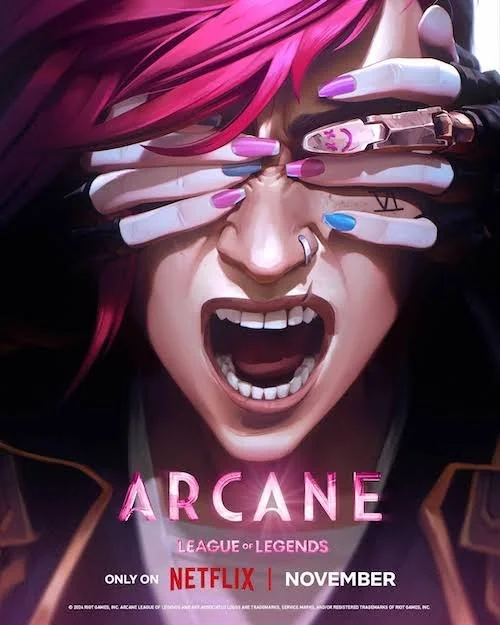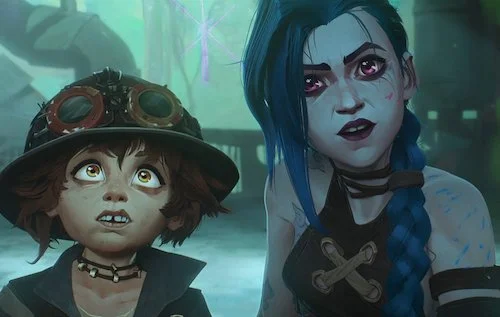Arcane Season 2: Binge, Fringe, or Singe?
Written by Andreas Babiolakis
Binge, Fringe, or Singe? is our television series that will cover the latest seasons, miniseries, and more. Binge is our recommendation to marathon the reviewed season. Fringe means it won’t be everyone’s favourite show, but is worth a try (maybe there are issues with it). Singe means to avoid the reviewed series at all costs.
In a year full of questionable, flawed, or disappointing programming (so much so that I haven’t had the heart to cover as much television as I typically do on Films Fatale), there hasn’t been a truly high bar to reach in 2024. With the gradual death of the Golden Age of Television happening in real time, I’ve come to accept that small screen viewing is going to be worse than the decades of privilege and prestige we’ve enjoyed. I was ready to settle for some fine — but not exemplary — programming winding up on my end-of-year list that encapsulates the strongest television of 2024 (whatever that may look like at this point). But then, like a gift from the heavens above, the second — and, sadly, final — season of Fortiche and Riot Games’ Arcane: League of Legends was released, with three episodes a week (for those who want to binge watch, but maybe need some self control as to not finish the series in one fell swoop). It’s the kick-in-the-ass that television needed in its weakest calendar year in quite some time; it’s sadly also a reminder, given how Arcane, too, is officially finished, how certain the end of the Golden Age truly is.
I’ve never played League of Legends. Despite my love for Arcane, I don’t exactly plan to, either. It doesn’t seem like my kind of leisure, given the video games’ style, competitive nature, and the dedication needed to keep up with the many years of practice other players have had. However, despite this lack of connection with Arcane’s source material, I feel fully acquainted with the characters who do appear in the game, this gestation of lore (I’m not sure how much of it pertains to the game itself). Would I entertain the idea of ever playing? If only to get closer with these protagonists I have grown to love, perhaps. The point is that Arcane is so separate from its source material (at least, concerning, how much you need to play the game in order to appreciate, or even understand, the series) that you can view it as its own property; as if the video game never even existed. That is how much work and dedication has gone into this series, and it shows from the breathtaking animation (that looks like video game concept art brought to life) to the post-production flourishes (crunchy, delicious sound editing, textured lighting, the works).
Arcane finishes as strongly as it began: with purpose, inspiration, and oomph.
What may have started off as a series to honour a beloved video game has become so much more. What kicked off as origin stories for the characters Vi and Jinx (born Violet and Powder, respectively) and the construction of their settings (the cities of Piltover and Zaun) has become a massive allegory depicting contemporary sociopolitical concerns, including a society collapsing in on itself, the rise of conflict and division between citizens, and how the brilliance of innovation can be used to slaughter. This was already true from Season 1, as we see sisters divided, Jayce’s discovery of arcane power’s usage, and Caitlyn’s uncomfortable position between her personal feelings and society’s expectations. In Season 2, these points are dialed up to eleven, not in any new way, but via a continuation of the organic growth of Arcane’s story: development that never feels forced or hurried, even within a measly eighteen episodes (at this rate, Arcane feels a bit like a miniseries, more than anything).
What we do experience in Season 2 are reality-breaking molds that question the concept of control (in a very meta way, almost as if questioning the function characters have in video games if they are controlled by an outside force, or the personas being donned are within the same realm of players configuring their avatar) and the fabric of time and space. In ways, without going quite as far (but with enough distance to make such a comparison), I felt like Arcane was mirroring the kind of existential rule-shattering that one can find in a like minded animated series, like, say, Neon Genesis Evangelion, where the art of a series can convey philosophical concepts and breakage in ways live action never could. As Arcane progresses in its second and final season, I questioned how much experimentalism would take place. While there wasn’t quite as much as I anticipated, there are enough examples to make the trip feel worth it on this front, from watercolour memories to the illusions of your Netflix stream glitching out (although only in minor ways). In a series that questions the authenticity of perception, Arcane tricks and rewards its audience enough aesthetically to feel at least somewhat unorthodox (which is a lot more than I can say about many other like-minded series).
Arcane experiments enough to have audiences question the overall bigger picture of the world depicted and its inhabitants.
Weirdly, as invested as we get in these characters, the deeply political narrative weaving (the kind of storytelling layering and complexity that a review without spoilers simply cannot explain well enough), and this new-age lore within a steam punk, dystopian fantasy land, these meta moments have us looking at the bigger picture: what does this all mean? By the time that finale concludes with bittersweet acceptance and hints of hope, what was Arcane all about? Did we learn about ourselves with this series? I’d argue we did, which is so much more interesting than many adaptations of video game projects that are so confused with their demographics and intentions that they become self absorbed. Arcane brings light to our involvement within societal turmoil, the downfall of humanity, and so many cataclysmic events that we cannot muster alone; even if we save ourselves, or just one other person, then that may be enough if we cannot save the world.
It’s easy to get blown away by the lush animation (which combines storybook illustrations with anime action) and memorable character and setting designs, but it’s just as simple to be hit with hard truths in a series that feels like the blending of a Pixar film with Attack on Titan. Even though you can see the hours of work put into each and every frame, in how the incredible voice acting is (especially from stars Hailee Steinfeld and Ella Purnell, who were born to play Vi and Jinx, respectively), and how each and every sound feels like you can grab them with your bare hands, Arcane came and went like a blip. Two seasons have come and gone, and the story finishes on what doesn’t feel like a conclusion but, rather, forbearance. That’s the kind of message we need nowadays: battles are no longer simple in this day and age, but we can hopefully get through them, even when the fate of the world feels awfully grim. With the series’ promise of the tapping into magical elements, Arcane helps us face universal divide and corrosion with a short bit of escapism with tastes of reality. Arcane itself is arcane: an otherworldly resource for us to see something new while facing the day. In the day and age of television’s deterioration, we bid farewell to yet another example of excellency which lasted long enough to remind us that quality — and goodness — can still exist even in the face of despair and finality.
Andreas Babiolakis has a Masters degree in Film and Photography Preservation and Collections Management from Ryerson University, as well as a Bachelors degree in Cinema Studies from York University. His favourite times of year are the Criterion Collection flash sales and the annual Toronto International Film Festival.






